An ordinance being proposed to the San Diego County Board of Supervisors tomorrow to create “free speech zones” for protests outside the County Administration Center raises serious free speech concerns that the San Diego ACLU conveyed to lawyers for the county in a letter sent today.
The ordinance would put new restrictions on where San Diegans can demonstrate. A memo accompanying the proposed ordinance noted that the space surrounding the County Administration Building, now featuring Waterfront Park, needs to be safe as a park and recreational space while still allowing demonstrators a place to express themselves.
The location has traditionally served as a public forum, as the County acknowledges. Public parks often function as a free forum for people without other means to express themselves, and that ability to express grievances to government officials is especially salient. The government is only able to enforce reasonable time, place, and manner regulations, and only if any restrictions are content-neutral, narrowly tailored to serve a significant government interest, and must leave open ample alternative channels of communication. A failure to meet any one of these points makes the restriction unconstitutional.
In reviewing the proposed ordinance, David Loy, legal director of the ACLU of San Diego & Imperial Counties, found several troubling issues that he asked the County to fix by further clarification or revision:
1) “Interfere” is impermissibly vague. Under the ordinance, “Regulated First Amendment Activities” are restricted to a “Free Speech Zone” unless a permit is obtained. The ordinance would regulate any activity, no matter the number of attendees, that would “interfere” with the uses and functions of the Waterfront Park and/or County Administration Center” if “conducted outside Free Speech Zones or with a First Amendment Activity Permit. The uses and functions include “wedding ceremonies…picnicking, lounging and general enjoyment” as well as “access to the County Administration Center building." Loy argues that the term “interfere” cannot justify restricting speech. Courts have ruled that it is “unduly vague” because it has no objective standard for determining how particular conduct would unlawfully interfere at a great enough level to restrict speech. Additionally, this proposed ordinance must be subjected to a higher level of scrutiny for vagueness because it regulates speech. Whenever First Amendment freedoms are at stake, courts analyze a measure’s “vagueness” more carefully “because uncertain rules inevitably chill protected speech.”
The ordinance language also appears to be unconstitutional because it would seem to authorize content-based restrictions on speech. If authorities felt that people’s “picnicking, lounging and general enjoyment” would be disturbed or that the park-goers might be offended, the result would be a restriction of speech—thus a violation of the First Amendment. How a person might react to speech “is not a content-neutral basis for regulation.”
2) “Free Speech Zones” are not narrowly tailored to the County’s interests. The San Diego ACLU says that the ordinance burdens substantially more speech than is necessary to address the County’s interest in safety and access. By excluding large swaths of the public park from speech activity, much more speech is being restricted than is necessary. If people or groups are actually interfering with access, they can be cited or arrested for unlawful obstruction. If noise issues are a concern, existing noise rules can be invoked. If a substantially large group wants to use the space, requiring sound systems, staging and other demands on the space, appropriate permits may be required.
Additionally, the small area of the “Free Speech Zones” compared to the park as a whole raises serious concerns that the zones are not narrowly tailored and do not leave open, ample alternative channels of communication. Courts have ruled that this effective sequestration from the vast majority of the public using the space—presumably part of the audience the protesters wish to communicate with—is impermissible.
3) Permit requirements are overly burdensome. A requirement to obtain a permit before engaging in speech is a prior restraint and drastically burdens free speech. The First Amendment obliges the government to justify any permitting requirements in s public forum, especially for political speech. The ordinance’s stipulation that a permit is required “regardless of the number of attendees” does not meet that justification. The ordinance’s requirement for advance notice of 20 days is similarly excessive, and the ordinance includes no exceptions for spontaneous events. The outside limit for advance notice for speech activities appears to be three days.
Lastly, the ordinance’s requirement for a permit applicant to “indemnify, save harmless and defend the County of San Diego” and have proof of insurance has no exclusions for losses to the County outside of the permittees’ control. Counter-protesters, hecklers, or County employees themselves could cause harm that the ordinance then makes the permittees responsible for.
The ACLU of San Diego & Imperial Counties hopes that with this deeper background on First Amendment law, the County will revise the problematic sections of this ordinance so that the County can continue to host a successful waterfront park and the public can exercise its hard-fought right to free speech.
ACLU Raises Concerns about County’s “Free Speech Zone” Proposal
Related Issues
Related content
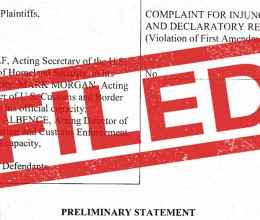
Journalists Sue Federal Government to Defend Free Press in ACLU...
November 21, 2019
The Justice Department Wants to Strip the Mongols Biker Club of Its...
February 25, 2019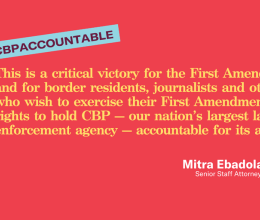
ACLU Statement on Ninth Circuit Decision Affirming First Amendment...
August 14, 2018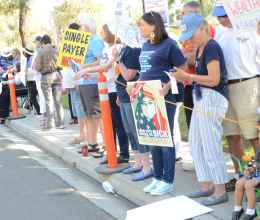
ACLU: CA Law Used to Cite Drivers Who Honk Their Horns During...
June 12, 2018ACLU Wins Suit Over Individuals’ Right to Protest and Monitor...
February 13, 2018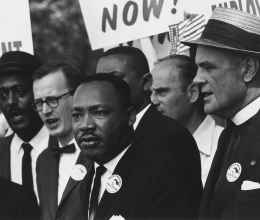
ACLU Condemns El Cajon’s ‘Food Sharing’ Ban and Subsequent Arrests...
January 15, 2018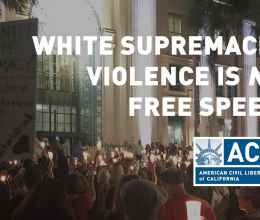
ACLU of California Statement: White Supremacist Violence is not...
August 16, 2017ACLU: City of Vista Must Permit Peaceful Protests Outside Rep....
June 1, 2017

